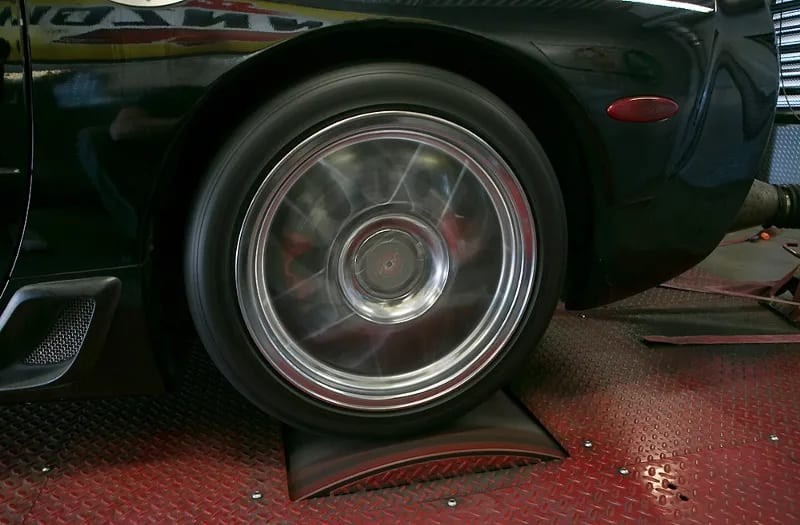Dyno tuning is a critical process for maximizing a vehicle’s performance, especially in racing. Utilizing a dynamometer, or dyno, allows for precise measurement and adjustment of engine parameters like horsepower, torque, and air-fuel mixture, leading to significant performance gains. This article delves into the intricacies of Dyno Race Car Tuning, exploring its benefits, types of dynos, preparation steps, and the difference between dyno and street tuning.
 Dyno tuning a race car
Dyno tuning a race car
Understanding Dyno Race Car Tuning
Dyno tuning involves placing a car on a dynamometer, which simulates real-world driving conditions. This controlled environment allows technicians to measure engine output accurately and make adjustments to optimize performance. There are two main types of dynos:
-
Engine Dyno: Measures engine performance directly by connecting to the engine’s crankshaft. This provides precise data on engine horsepower and torque without the influence of drivetrain losses.
-
Chassis Dyno: Measures power at the wheels, taking into account drivetrain losses. This type of dyno is more common for tuning as it provides a more realistic representation of a car’s performance on the road or track.
Benefits of Dyno Tuning for Race Cars
Dyno race car tuning offers several significant advantages:
-
Increased Horsepower and Torque: Fine-tuning engine parameters results in noticeable gains in horsepower and torque, enhancing acceleration and overall speed.
-
Improved Drivability: Optimizing the air-fuel mixture and ignition timing improves throttle response and engine smoothness, leading to a more responsive and predictable car on the track.
-
Minimized Backfire and Engine Issues: Precise tuning helps prevent backfires and other engine problems, ensuring reliable performance and reducing the risk of damage.
-
Maximized Performance Gains from Modifications: Dyno tuning is crucial for extracting the full potential of performance modifications like exhaust upgrades, intake systems, and engine internals.
Preparing Your Race Car for Dyno Tuning
Before a dyno tuning session, meticulous preparation is essential to ensure accurate readings and optimal results:
-
Inspect Plugs and Filters: Replace worn spark plugs and air, oil, and fuel filters to ensure optimal combustion and airflow.
-
Check Fluids: Verify all fluids, including engine oil, coolant, transmission fluid, and differential fluid, are at the correct levels and in good condition.
-
Inspect Belts and Hoses: Examine belts and hoses for wear and tear, replacing any damaged components to prevent failures during the tuning process.
-
Check Tires: Ensure tires are properly inflated and in good condition to maintain consistent contact with the dyno rollers.
Dyno Tuning vs. Street Tuning
While both methods aim to optimize engine performance, dyno tuning provides a more controlled and accurate approach compared to street tuning. Street tuning involves adjusting engine parameters while driving, making it challenging to achieve precise adjustments and posing safety risks. Dyno tuning, performed in a controlled environment, allows for meticulous data analysis and adjustments, resulting in more refined performance gains.
Dyno Tuning FAQs
Q: How much does dyno tuning cost?
A: Dyno tuning costs vary depending on the complexity of the tune, the type of vehicle, and the labor rates of the tuning shop. Expect to pay anywhere from a few hundred dollars for a basic tune to over a thousand dollars for extensive tuning on a high-performance race car.
Q: How long does a dyno tune take?
A: The time required for a dyno tune can range from a couple of hours for a simple tune to several hours or even a full day for more complex tuning sessions on heavily modified vehicles.
Conclusion: Elevate Your Racing Performance with Dyno Tuning
Dyno race car tuning is an indispensable tool for maximizing performance on the track. By providing a controlled environment for precise measurement and adjustment, dyno tuning allows technicians to unlock hidden horsepower, optimize drivability, and ensure the reliability of your race car. Proper preparation and choosing a reputable tuning shop are crucial for achieving the best possible results.
